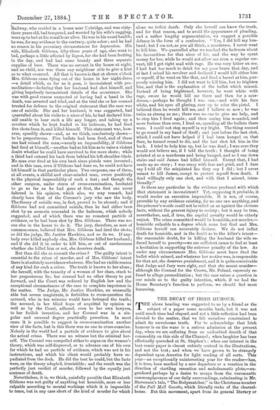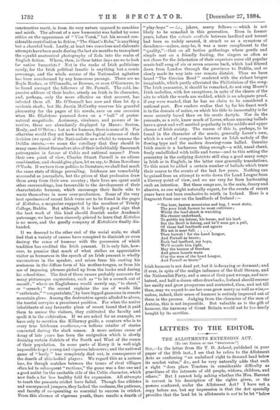THE DECAY OF IRISH HUMOUR.
THE above heading was suggested to us by a friend as the subject of a paper some months back, but it was not until much time had elapsed, and not a little reflection had been devoted to the matter, that we felt ourselves constrained to admit its unwelcome truth. For to acknowledge that Irish humour is on the wane is a serious admission at the present day, when we are suffering from an undoubted dearth of that commodity on this side of the Channel ; when laughter has been effectually quenched at St. Stephen's ; when our interest in the best comic paper is almost entirely centred in the illustrations, and not the text ; and when we have grown to be strangely dependent upon America for light reading of all sorts. This year—an exceptionally uninteresting year for the reader—has, it is true, been marked by a new departure or a reaction in the direction of startling sensation and melodramatic plots,—en- gendered perhaps by a desire to escape from the unromantic commonplaceness of our daily surroundings, culminating in Mr. Stevenson's tale, " The Bodysnatcher," in the Christmas number of the Pall Mall Gazette, which literally reeks of the charnel- house. But this movement, apart from its general literary or constructive merit, is from its very nature opposed to sunshine and mirth. The advent of a new hnmourist was hailed by some critics on the appearance of " Vice Versa," but his second con- siderable contribution to fiction," The Giant's Robe," is anything but a cheerful book. Lastly, at least two conscious and elaborate attempts have been made during the last six months to transplant the squalid anatomical photography of Zola into the realm of English fiction. Where, then, in these latter days are we to look for native humorists ? Not in the ranks of Irish politicians surely, for the Irish political fanatic is anything but a comic personage, and the whole course of the Nationalist agitation has been unredeemed by any humorous passage. There are no Boyle Roches, or O'Connells, or Dowses, or even O'Gormans, to be found amongst the followers of Mr. Parnell. The cold, im- passive address of their leader, utterly un•Irish in its character, and, perhaps, only the more effective on that account, has infected them all. Mr. O'Donnell has now and then let fly a sardonic shaft ; but Mr. Justin McCarthy reserves his graceful pleasantry for the pages of his novels, save on one occasion when Mr. Gladstone pounced down on a "bull" of preter- natural magnitude. Acrimony, virulence, and powers of in- vective, these are abundantly displayed by Messrs. Sexton, Healy, and O'Brien ; but as for humour, there is none of it. For otherwise would they not have seen the logical outcome of their decision (we speak of the Nationalists as a whole) to rename the Dublin streets,—we mean the corollary that they should in many cases divest themselves also of their indubitably Sassenach patronymics in favour of Celtic and national names ? From their own point of view, Charles Stuart Parnell is an odious combination, and should give place, let us say, to Brian Boroihme O'Toole. If we turn from politics to literature, we shall find much the same state of things prevailing. Irishmen are remarkably successful as journalists, but the prizes of that profession draw them away from their own country ; their lives are spent amid other surroundings, less favourable to the development of their characteristic humour, which encourage their facile wits to waste themselves in mere over-production. Some of the very best specimens of recent Irish verse are to be found in the pages of Sottabos, a magazine supported by the members of Trinity College, Dublin. But although it is hardly a good sign that the best work of this kind should flourish under Academic patronage, we have been sincerely grieved to learn that Kottabos is no more, and the goodly company of Kottabistee finally dis- banded.
If we descend to the other end of the social scale, we shall find that a variety of causes have conspired to diminish or even destroy the sense of humour with the possession of which tradition has credited the Irish peasant. It is only fair, how- ever, to premise that much of what strikes an appreciative visitor as humorous in the speech of an Irish peasant is wholly unconscious in the speaker, and arises from his casting his sentences in the diffuse form of his mother-tongue, or from his use of imposing phrases picked up from the books read during his school-time. The first of these causes probably accounts for many picturesque expressions, such as " to let a screech out of oneself ; " where an Englishman would merely say, "to shout," or " screech ; " the second explains the use of words like " exthricate," " congratulate,".by bare-legged gossoons in remote mountain glens. Among the destructive agents alluded to above, the tourist occupies a prominent position. For when the native inhabitants at any favourite place of resort found that it paid them to amuse the visitors, they cultivated the faculty and spoilt it in the cultivation. If we are asked for an example, we have only to mention the Killarney guide, a creature who is to every true Irishman anathema,—a tedious retailer of stories concocted during the slack season. A more serious cause of decay of late years has been the emigration which is slowly draining certain districts of the South and West of the cream of their population. In some parts of Kerry it is well-nigh impossible to get young and vigorous labourers ; and the national game of " hurly " has completely died out, in consequence of the dearth of able-bodied players. We regard this as a serious loss, for though matches between the teams of rival villages often led to subsequent "ructions," the game was a fine one and a good outlet for the excitable side of the Celtic character, which now finds a far less healthy field for expansion. All attempts to teach the peasants cricket have failed. Though fine athletes and unsurpassed jumpers, they lacked the coolness, the patience, and faculty of co-operating so essential to success in cricket. From this absence of vigorous youth, there results a dearth of " play-boys " — i.e., jokers, merry fellows — which is not likely to be remedied in this generation. Even in former years, before the entente cordials between landlord and tenant
had been so rudely severed, it struck us as a symptom of decadence—unless, may-be, it was a mere compliment to the "quality,"—that on all festive gatherings where gentle and simple met on a friendly footing, the singers as often as not chose for the delectation of their superiors some old popular music-hall song of six or seven seasons back, which had filtered down from London through the provinces to Dublin, and so slowly made its way into our remote district. Thus we have heard "The Grecian Bend" rendered with the richest brogue imaginable, which partly alleviated the Philistinism of the song. The Irish peasantry, it should be remarked, do not sing Moore's Irish melodies, with few exceptions, in spite of the charm of the airs to which the words are wedded, which is an adequate proof, if any were wanted, that he has no claim to be considered a national poet. Few readers realise that by far his finest work is in the domain of satire, on which his title to immortality is far more securely based than on his erotic dactyls. Nor do the peasants, as a rule, know much of Lover, whose amusing ballads have a great and well-merited popularity in the middle and upper classes of Irish society. The reason of this is, perhaps, to be found in the character of the music, generally Lover's own, which is a sort of compromise between an Irish melody of the flowing type and the modern drawing-room ballad. Genuine Irish music is a barbarous thing enough—a wild, nasal chant, freely embellished with trills and turns—and to this setting the peasantry in the outlying districts still sing a good many songs in Irish or in English, in the latter case generally translations.
To this must be added a certain number of ballads which trace their source to the events of the last few years. Nothing can be gained from an attempt to write down the Land League from a literary point of view, and we are very far from harbouring such an intention. But these songs are, in the main, dreary and abusive, as one might naturally expect, for the events of recent years have not been conducive to mirth in Ireland. Here is a fragment from one on the landlords of Ireland :—
" The bare, barren mountains and bog, I must state,
The poor Irish farmer he must cultivate ; Whilst the land-shark is watching His chance underhand, To gobble his labour, his house, and his land.
But the Devil is fishing, and he'll soon get a pull, Of those bad landlords and agents His net is near full Then hurrah ! for the Land League, And Parnell so brave ; Each had landlord, my boys, We'll muzzle him tight.
May the banner of freedom And green laurels wave O'er the men of the Land League, And Parnell so brave."
Irish humour is not dead yet, but it is decaying or dormant ; and if ever, in spite of the malign influence of the Gulf Stream, and the Nationalist Party, and a sense of their past wrongs, and race- hatred, and half-a-dozen other drawbacks, Ireland should recover her sanity and grow prosperous and contented, then, and not till then, may we expect to see her sons grow merry as well as wise,— unless, indeed, their sense of humour is entirely improved out of them in the process. Judging from the character of the men of Antrim, this is not impossible. But valuable as is the gift of humour, the harmony of Great Britain would not be too dearly bought by its sacrifice.



































 Previous page
Previous page